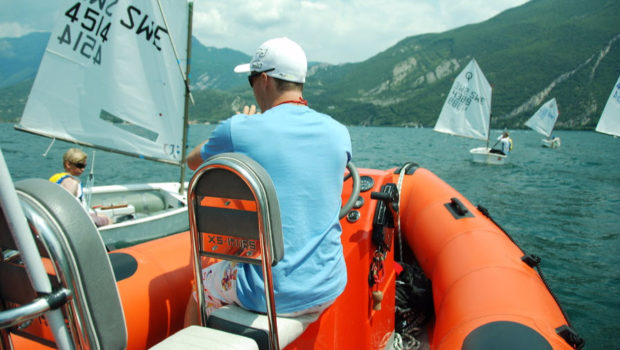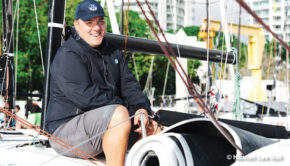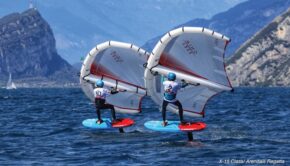Time To Address the Coaching Issue
Published on December 12th, 2016
Jonathan McKee won Olympic medals at the 1984 and 2000 Games, and after witnessing the 2016 Olympics, he reports in Sailing World magazine that it’s time to address the coaching issue….
I had the honor of coaching our American Nacra 17 team of Bora Gulari and Louisa Chafee at the Rio Olympics. It was a great experience on many levels, but I came away feeling that the coaching aspect of the Olympics is too dominant. Today, at a typical Olympic-class event, you’ll find that each sailor competing has his or her own coach boat, typically a 16-foot RIB with a 60 hp engine.
I’m not against coaching per se, especially if it helps the sailors improve, but I’m not convinced that hands-on coaching at major events such as the Olympics is necessary or warranted. It’s gotten to the point where having so many support boats on the water detracts from the sailors’ experience.
Once upon a time, sailors had to get to and from the racecourse themselves and be self-sufficient once on the water. They had to carry their own food and water, have reasonable spares and clothing, and figure out their own tactics and strategy for each race. In other words, sailing should require and reward self-sufficiency, and today some of that is lost.
What are the alternatives to a coach boat for every sailor? I have a few ideas. Water, food and extra gear, for example, could be off-loaded to a neutral boat stationed on the racecourse. Race-committee boats could provide tows to the course if needed. Having fewer motorboats on the course would reduce wakes, distractions, and pollution.
Why not put all the coaches on one boat, as was done in some past Olympics? It works in college racing. A coach’s barge could be comfortable and well equipped but slightly removed from the racing area. Small communication devices, such as phones or two-way radios, could easily allow the sailors and coaches to communicate from the barge between races — or even from shore.
While it’s true that coach boats can serve as safety and support boats during training and regattas, this shouldn’t be the primary reason for their presence. The event organizers should have direct oversight of the safety fleet so they can manage it effectively.
I would support banning coach boats for all but training regattas. Certainly there is a place for coaching during training or practice regattas, to speed up learning, but when it comes to big events, let’s give the water back to the athletes and send a message that sailing is an athlete-driven sport, not a coach-driven sport.
Note: To read other reports by Jonathan McKee in Sailing World…click here.
Editor’s note: Malcolm Page, a double Olympic medalist for Australia, and the newly appointed Chief of Olympic Sailing for USA, shared a similar viewpoint in this report. It is notable to have people like McKee and Page see the escalation of this issue needing to be addressed, particularly since the coaching industry will continue to grow and may push boundaries that can impact the cost and approach to compete.









 We’ll keep your information safe.
We’ll keep your information safe.